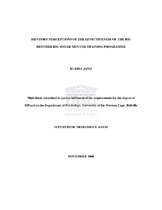| dc.contributor.advisor | Adam, Mohamed E. | |
| dc.contributor.author | Jano, Rubina | |
| dc.contributor.other | Dept. of Psychology | |
| dc.contributor.other | Faculty of Community and Health Sciences | |
| dc.date.accessioned | 2014-02-07T12:33:56Z | |
| dc.date.available | 2010/03/25 21:15 | |
| dc.date.available | 2010/03/25 | |
| dc.date.available | 2014-02-07T12:33:56Z | |
| dc.date.issued | 2008 | |
| dc.identifier.uri | http://hdl.handle.net/11394/2791 | |
| dc.description | Magister Psychologiae - MPsych | en_US |
| dc.description.abstract | Mentoring has gained a great deal of popularity across various professional fields and disciplines over the past few years. More recently, planned mentoring has become an important form of intervention with young people (Philip, 2003). Although mentoring can be an effective strategy for dealing with youth, the mentoring is only as good as the relationship that develops out of the process between mentors and mentees and the match that is made between the two parties. The number of mentor programmes that is running continues to grow yet the quality of these programmes remains unknown as this area lacks agreed upon sets of standards and / bench marks that could be used to determine the effectiveness of these programmes (Sipe, 1988 -1995). The primary aim of this study is to evaluate the mentors' perceptions of the effectiveness of a mentor training programme run by Big Brother Big Sister South Africa. | en_US |
| dc.language.iso | en | en_US |
| dc.publisher | University of the Western Cape | en_US |
| dc.subject | Mentor | en_US |
| dc.subject | Mentee | en_US |
| dc.subject | Training programme | en_US |
| dc.subject | Evaluation | en_US |
| dc.subject | Big Brother Big Sister | en_US |
| dc.subject | Support mechanism | en_US |
| dc.subject | Personal growth | en_US |
| dc.subject | Mentor role | en_US |
| dc.title | "Mentors' perception of the effectiveness of the Big Brother Big Sister mentor training programme" | en_US |
| dc.type | Thesis | en_US |
| dc.rights.holder | University of the Western Cape | en_US |
| dc.description.country | South Africa | |

